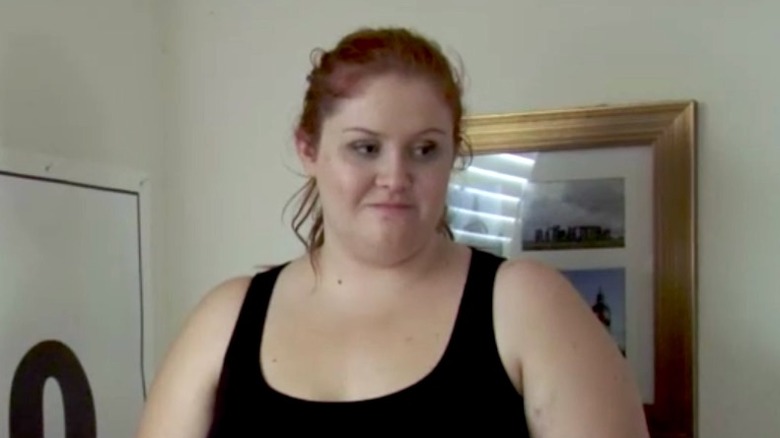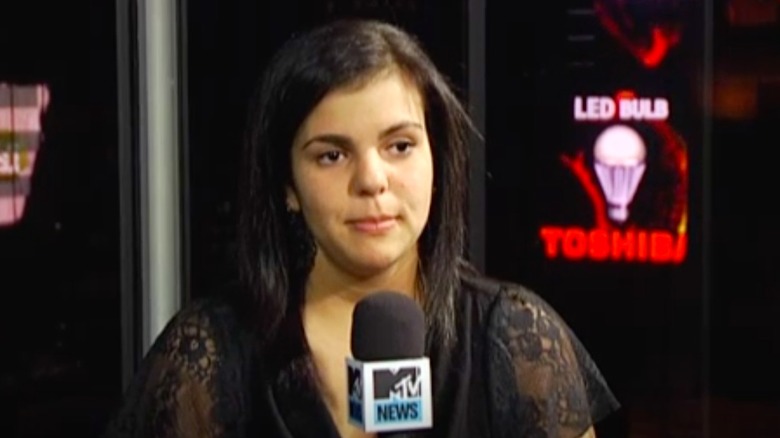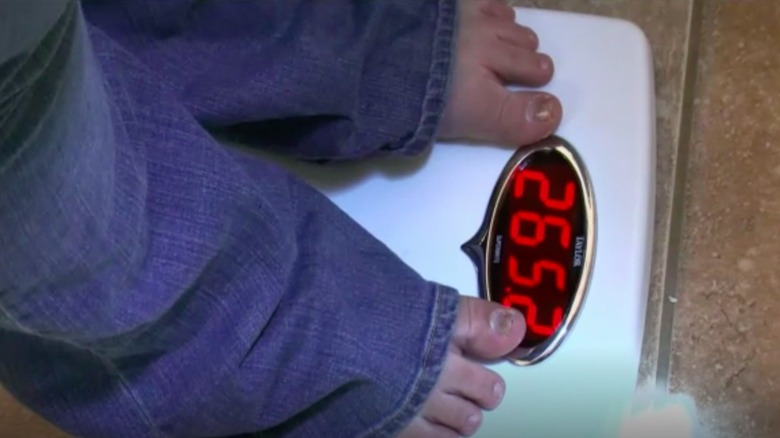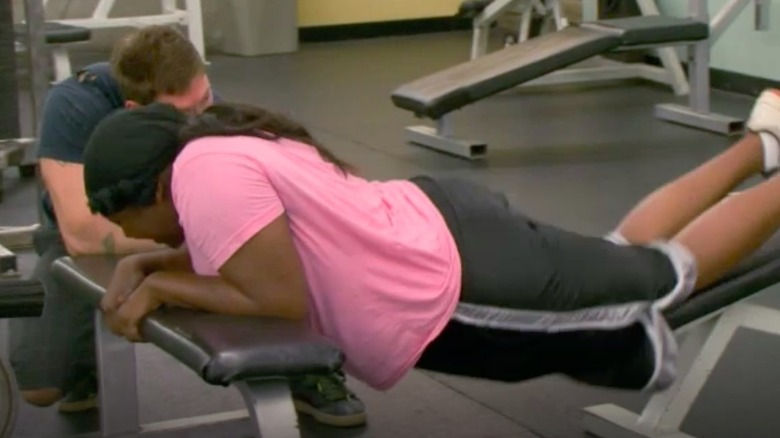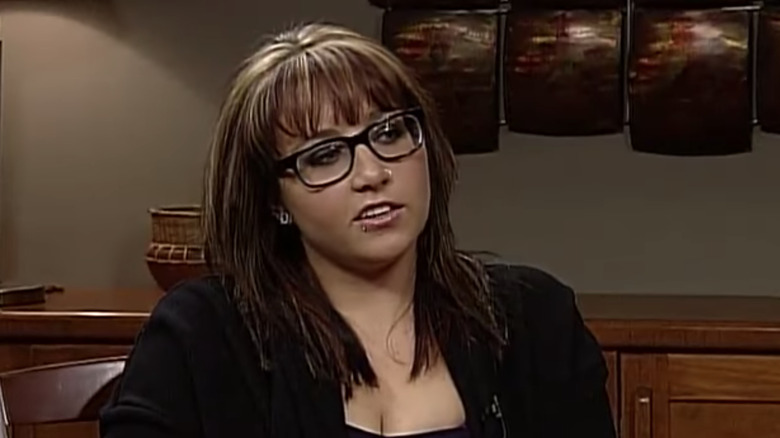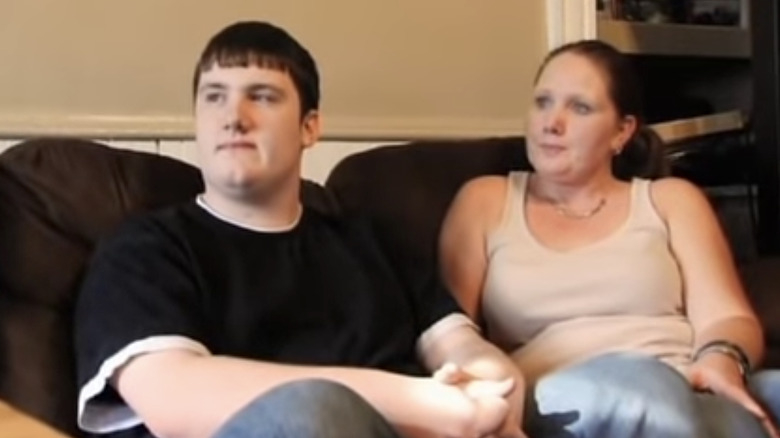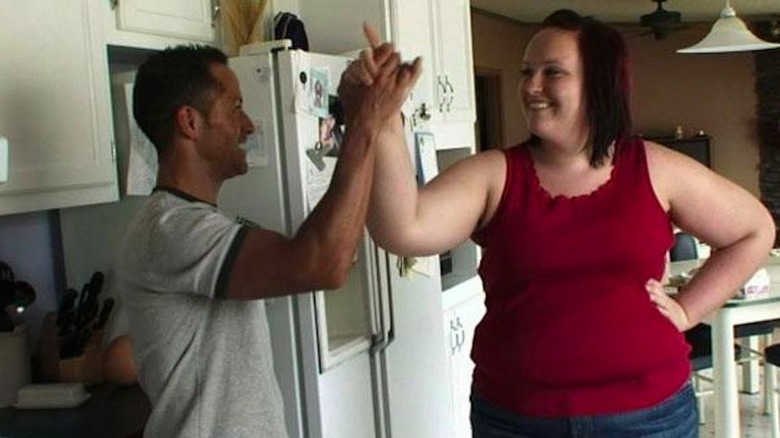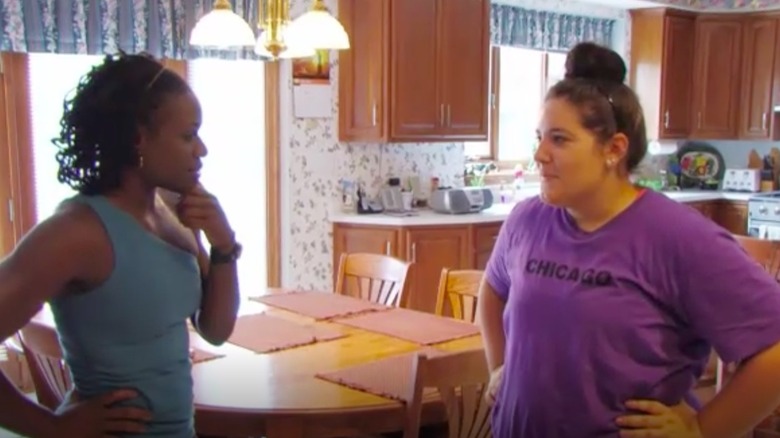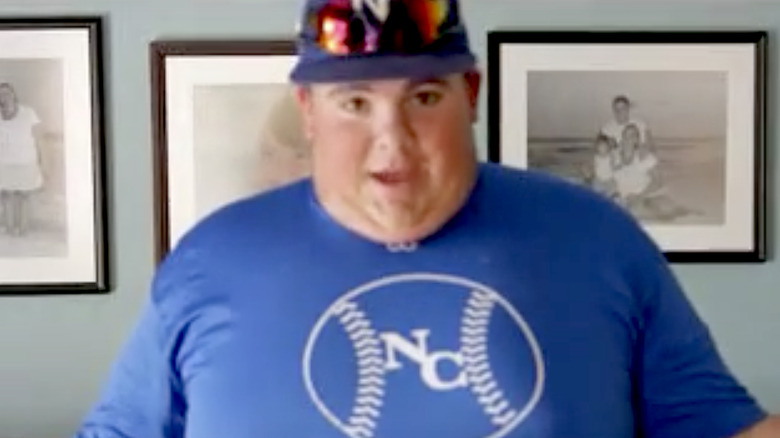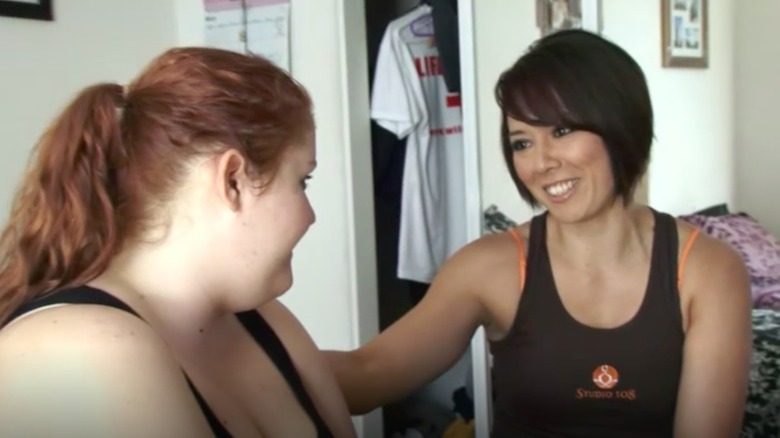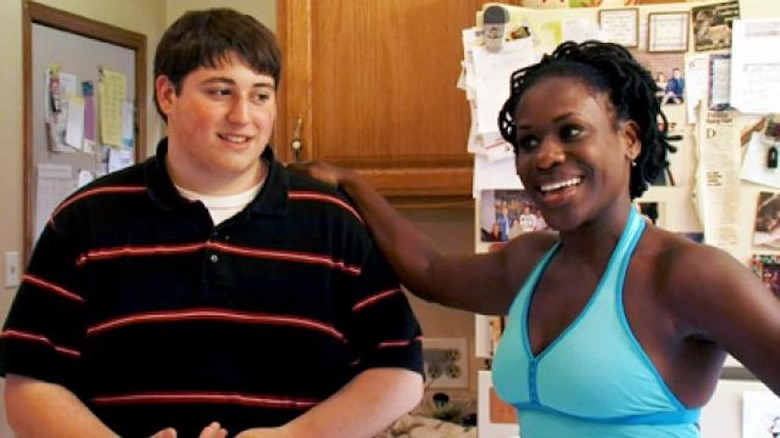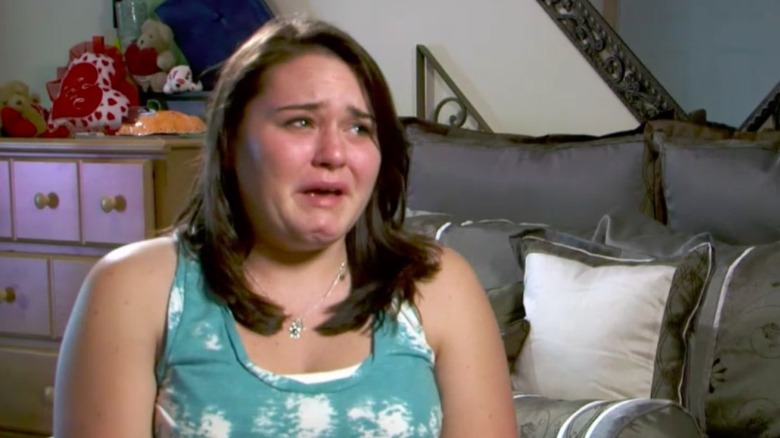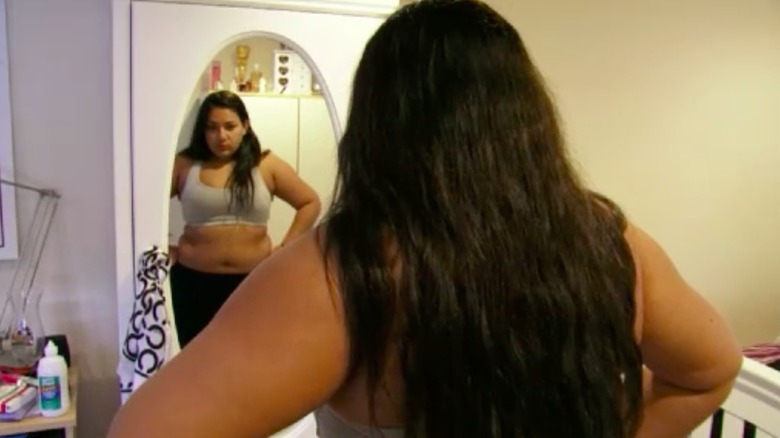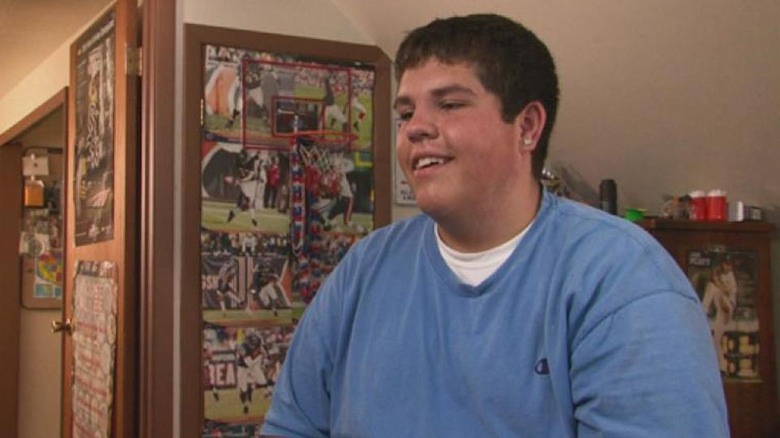The Untold Truth Of I Used To Be Fat
I Used to Be Fat, an MTV reality show, offered a unique perspective by focusing on a very specific demographic as America's obesity epidemic continued to escalate: overweight high school graduates bound for college. Debuting in late December 2010, I Used to Be Fat offered obese teens the opportunity to work with trainers, doctors, and nutritionists in order to slim down during the summer between graduation and college, essentially transforming their physical selves ahead of the already-transformative experience of attending university.
"That reboot of your life can happen over one summer," J.D. Roth, executive producer of I Used to Be Fat and CEO of 3 Ball Entertainment, which also produced such similarly themed series as The Biggest Loser, What's Eating You, and Extreme Makeover: Weight Loss Edition, told Broadcasting + Cable. "The kids who really dedicated themselves and really wanted this made changes that are staggering. We had multiple kids lose 100 pounds."
Read on to learn all about the untold truth of I Used to Be Fat.
How I Used to Be Fat completely changed one teen's life
One of the participants in the first season of I Used to Be Fat was homecoming queen Gabriella Caloiero, whose weight-loss journey resulted in her shedding an incredible 90 pounds (via NBC Philadelphia). "There's no shortcut," she said of her transformation in an MTV video Q&A. "It really is eating right and exercising." She's not wrong, as exercising is just one of the key ways to lose weight.
As Caloiero told Seventeen, the show led her to completely overhaul not just her diet but her lifestyle as well. As a result, the changes she experienced were profound, extending far beyond simply losing weight. And chances are she had to unlearn a lot of false facts people believe about dieting and figure out what things to give up to keep weight off long term.
"Losing weight is not only a physical journey. It's an emotional journey, too," she said. "I sometimes feel like the 253-pound girl I used to be. Everyone has bad days, you just have to stay strong. And it's so important to not let what anyone says get to you." She continued, "You control your own destiny. Loving yourself keeps you going. If you didn't love yourself, you wouldn't care about losing weight and making your life better and healthier. Always remember to give yourself credit even when others may not, and don't rely on others for your happiness."
Fans of I Used to Be Fat shared their own before and after photos
I Used to Be Fat not only entertained viewers, but it also inspired them. That was evident when MTV posted a 2011 call on the show's Facebook page asking fans to send along before and after photos of their own weight loss. According to MTV News, "immediately [they] were flooded with some incredible responses," highlighting stories, "along with the jaw-dropping before and after pics!"
In addition to photos, fans also shared their uplifting tales. One viewer, Jennifer, revealed that watching Gabriella Caloiero's episode gave her the impetus to follow her lead. "Seeing this young girl, Gabby, struggling with weight problems most of her life and then finally taking charge of herself and pushing every day to eat healthy and exercise as much as possible was just so inspiring to me," she wrote.
Another fan, Ashley, said she was a nun when she saw an episode of I Used to Be Fat, but "knew it was everything that I was not supposed to be doing." Watching the episode made Ashley feel "connected with her desire to make a change, even if the change seemed impossible..."
A nutritionist dubbed I Used to Be Fat one of TV's top five weight-loss shows
Some TV shows focusing on weight loss have faced criticism for promoting too-rapid, unhealthy techniques framed in a weight-loss competition. One former contestant on The Biggest Loser, for example, blasted the show as "a fat-shaming disaster that I'm embarrassed to have participated in," as reported by the New York Post.
While I Used to Be Fat presumably received some similar criticism, the show also received positive feedback from experts. Women's Health asked nutritionist Jim White, owner of Jim White Fitness & Nutrition Studios in Virginia and a spokesperson for the Academy of Nutrition and Dietetics, to select the five best weight-loss shows on television. One of his top five was I Used to Be Fat.
"I like I Used to Be Fat because it specifically reaches out to a younger crowd," White explained, emphasizing the importance of the show's trainers in the lives of the young people trying to lose weight. "Because teenagers are supported by their parents, it can be difficult to have a say in what's bought at the grocery store, or if he or she can have a gym membership," he added.
Female participants on I Used to Be Fat felt a different type of pressure
Most television shows are teeming with thin, gorgeous celebrities. I Used to Be Fat was not one of those shows. As series participant Kelly Sanders told Inforum, she was "really nervous" about being compared to all those beautiful TV stars. "It was really nerve-wracking in the beginning," she explained. "I had trouble ... when they had me trying on tighter clothes."
Meanwhile, she learned that old saying about television cameras adding weight was not hyperbole. "I never thought I was as big as I was on TV. I never saw myself like that. It was an eye-opener for me," she admitted. "Even when I was down in body type, I was worried about being on TV because I was not as small as certain celebrities. They didn't show this on the episode; my trainer and I did a lot of weight training. For us it was about being healthy, not just the weight."
Having maintained her healthy lifestyle after her experience on the show ended, she added, "I don't really weigh myself, but I go by how my clothes fit and how I feel."
How MTV's I Used to Be Fat found its subjects
Students who wanted to appear on the MTV show I Used to Be Fat could reportedly apply via email. The website EDUInReview.com revealed that it had received "many, many inquires about how to get on the show" in 2011, adding, "We finally have the answer. Today, MTV announced that they are looking for high school seniors who have 40 to 100 pounds to lose to star on the second season of the docuseries."
According to EDUInReview.com, I Used to Be Fat's casting directors would "be traveling to Boston, Los Angeles, Chicago and Dallas," and "ideal cast members" would live no more than 50 miles outside any of those cities. Prospective participants were given an email address to contact, urging students to "be sure to include a paragraph explaining why you want to be on the show and lose weight before starting college."
This singer-songwriter received exposure when her song was used in I Used to Be Fat
I Used to Be Fat helped numerous teenagers lose weight before college, yet the show also provided some unexpected exposure for singer-songwriter Natascha Hagen, whose song "Run" was used on the show. "The basic idea behind 'Run' is that it's a really inspiring tune designed to help those who listen to it," Hagen wrote in a blog post. "'Run' is one of those songs you put on your iPod while you're working out or running to give yourself the motivation to keep on going until the job is done right. It's all about helping you reach your goals and getting motivated to get off your tail and start working out."
She added, "One of the main points that I tried to make when recording this song is that you have to be willing to overcome your personal doubts and fears if you want to succeed. ... This makes the song 'Run' an obvious choice for the I Used to Be Fat MTV show."
I Used to Be Fat was the subject of a college dissertation
I Used to Be Fat was the subject of a Master's thesis submitted to Canada's University of Windsor. "Through an analysis of MTV's television show I Used to Be Fat, this paper looks at reality television and the weight-loss format in particular, as expressions of the coming into being of the modern subject within the contemporary culture of self-revelation," read the abstract for "Modern Myth and Masculine Character: Revealing the fit 'self' in MTV's I Used to Be Fat."
"Through the cultural myth of fast transformation by overcoming the body, heroic narratives depict subjects renouncing their fat bodies in order to produce themselves anew," the abstract continued. "Drawing on Michel Foucault's late work on Christian technologies of the self, this paper asserts the continuity of ascetic ethical practices in the representation of modern fitness." The paper claimed to show "the continuities of ascetic transformation discourse as represented in I Used to Be Fat."
Who knew a reality TV show could become a key component of someone's higher education?
One student on I Used to Be Fat lost 80-plus pounds and became a college athlete
Trevor Russell's love of baseball led him to I Used to Be Fat, due to concerns that his weight would hold him back from his dreams of playing the sport in college and beyond. "I want to go to that next level and play college baseball, but I can't run," Russell said in his episode. By the time he was accepted on North Lake College's baseball team, he had lost a whopping 81 pounds. Clearly, Russell learned firsthand what really happens when to your body when you lose a lot of weight.
Speaking with the now-defunct North Lake College News-Register, Russell said his attitude was to "go after it," revealing at the time he was just five pounds short of his weight-loss goal of 100 pounds. "I've still got some weight that I could lose," he admitted.
Discussing the nutrition and exercise lessons that he learned from his time on I Used to Be Fat, Russell declared he was in it for the long haul. "I'm not really planning on stopping," he said. "A lot of people looked at it as a diet, but I looked at it as a lifestyle for me."
Fans of I Used to Be Fat can hire one of the show's trainers
Annie Malaythong was one of the trainers who helped overweight teens achieve their weight-loss goals on I Used to Be Fat, and she can help people achieve their goals outside the boundaries of the show. Based in Atlanta, Ga., Malaythong "is all about motivating her clients to reach their full potential and producing serious results," as her website states.
"A former pole vaulter once competing to represent the country of Laos in 2008 Olympics, she naturally fell in love with helping others to reach their full potential in mind, body and soul," her bio continues. "Her passion and thrill for helping others comes from an innate desire to never have anyone experience what she was faced as a teen and once again in her college athletic career."
Anyone seeking her fitness expertise can reach Malayathong through her website. "She is nowhere close to stopping," the site added, "nor will her passion for helping others."
One subject in I Used to Be Fat initially thought he was participating in a research study
Sammy Traverso appeared in I Used to Be Fat, and, in an interview with the Marquette Wire, he revealed his journey to the show began when his mother found an ad on Craigslist seeking "high school seniors who want to lose weight."
According to Traverso, who was a college freshman at the time of the interview, he initially didn't realize he was being cast for a television docuseries. "I thought it was some sort of paid research study," he said. Once he committed to the show, Traverso began a grueling daily regimine that included "intense" cardio, an hour and a half of weight training, and then another hour of cardio. "Every day, my shirt was completely soaked with sweat," he said.
Once his experience on the show ended, producers offered to set him up with a personal trainer when he got to college. He declined, and he offered an inspiring reason why. "I wanted to know for myself that I could continue to lose weight at college without a trainer," Traverso said.
I Used to Be Fat showcased an innovative new workout tool
Edison Nation is an innovative company that helps creators of new products bring their inventions to market, serving as a conduit between inventors and potential customers. During the show's run, an Edison Nation fitness product actually found its way into I Used to Be Fat when it was utilized by trainers in the series.
The invention of former Miss Georgia Jennifer Holloway, the Workout 180 was developed as "an alternative to high-impact aerobics that can cause pain in the joints of the knees and ankles."
"Jennifer's multi-faceted workout tool will be featured all season long on MTV's hit show, I Used to be Fat," Edison Nation announced on its website. "Jennifer joined the Edison Nation family as an inventor on Season 1 of Everyday Edisons and we've never stopped pushing to make Workout 180 a household name. We can now add MTV's massive audience to those who know of the greatest exercise machine since Bruce Lee."
I Used to Be Fat was criticized for ignoring the teenagers' psychological issues
I Used to Be Fat proved to be successful in helping teens transform their bodies, but how successful was it in changing their inner selves? According to a critique in Psychology Today, it could have done better.
Doctor of psychology Jeremy Clyman wrote of one of the show's participants, "being fat was the problem, and getting skinny was the solution." However, Clyman pointed out that for those who "want to 'change who they are' there's typically other elements of the equation that are more central to the problem," adding, "These elements tend to remain unarticulated, and poorly understood, and relate to something called self-view."
When one of the show's participants indicated that "he doesn't like the spare tire around his waist, there is likely an inner dialogue of self-blame and self-loathing churning away in the back of his mind that is the REAL problem," added Clyman. He explained that the "real treatment here is not going to be the pushups and wind sprints ... but a sense of increased confidence and mastery" that can be achieved with "a few implicit rules and skills that promote healthy social and emotional functioning."
One participant's experience on I Used to Be Fat impacted her college career path
Lindsey Siegel's experience on I Used to Be Fat was life-changing in more ways than one. Not only did she lose 55 pounds, adopt a healthier lifestyle, and gain self-confidence, but she was also inspired toward a career path that likely wouldn't have been a possibility had she not appeared on the show.
Thanks to her experience on I Used to Be Fat, Siegel decided to study communications, with a goal of becoming a publicist and the hope of landing an internship with MTV, a network that's been home to shows like MTV Cribs and Road Rules. "It was the most amazing experience of my life," she told the Long Island Herald of her time on the show.
Siegel's experience with I Used to Be Fat also proved to be inspiring to her mother, ultimately spurring her to make similar changes in her own life and lose 50 pounds herself. "I've always been proud of her, but the woman she's becoming, it's amazing to me," said Siegel's mom, Janine. "I'm so proud of my daughter. It's been an unbelievable journey."
This teen believes he might be dead if not for I Used to Be Fat
At 16, Kevin Pemberton stood at 5'9" and weighed 294 pounds. That, he told DNAInfo, was when he hit bottom. "I just looked at myself in the mirror and said, 'This has to change.'" He noted, "I just wanted to better my life so I could live longer."
Hitting bottom led him to apply to I Used to Be Fat. On the first day of taping, Pemberton weighed 276 pounds. When he finished, he was down to 198. That was the result of intense workouts with personal trainer Matthew Roeske, who said he'd trained more than 1,000 people but had never been more proud of a student than he was of Pemberton. "He just never gave up," said Roeske, recalling when Pemberton burned 8,000 calories in a single day after 11 hours and 16 minutes of cardio. "I meet a lot of people who piss me off because they quit, and he kept at it."
Roeske shared his belief that, if not for I Used to Be Fat, Pemberton would likely have weighed 400 pounds. Pemberton agreed, saying he might even be dead.
